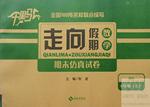题目内容
The government________air quality in urban areas from levels one to five: excellent, fairly good, slightly polluted, poor and dangerous.
A. classifies B. arranges
C. distributes D. divides
练习册系列答案
 千里马走向假期期末仿真试卷寒假系列答案
千里马走向假期期末仿真试卷寒假系列答案
相关题目
题目内容
The government________air quality in urban areas from levels one to five: excellent, fairly good, slightly polluted, poor and dangerous.
A. classifies B. arranges
C. distributes D. divides
 千里马走向假期期末仿真试卷寒假系列答案
千里马走向假期期末仿真试卷寒假系列答案